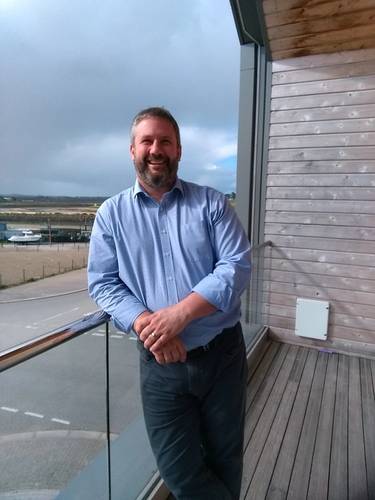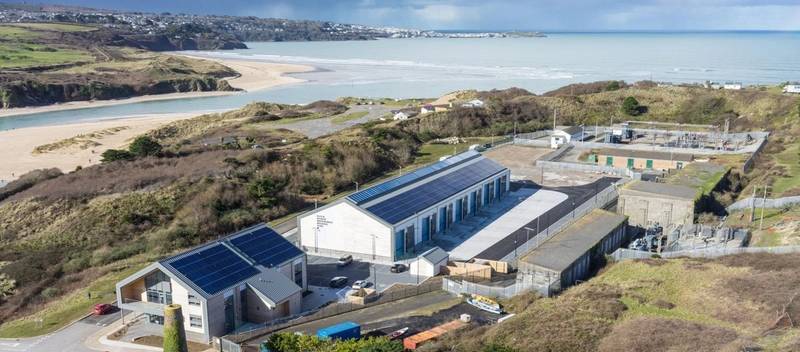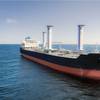Innovation Starts @ Marine Hub Cornwall
Marine Hub Cornwall are on a mission to showcase the UK’s southwest coast as a world class center for marine technology and innovation. Working alongside Invest in Cornwall, which manages inward investment into the region, Marine Hub’s Operations Director, Matt Hodson, explains why he believes Cornwall is best positioned to be a global hub for the marine renewable industry.
To kick off, can you give the readers a brief overview of your experience and what led you to become the Operations Director at Marine Hub?
I’ve spent much of my early career at sea and I’m lucky enough to have worked across a wide spectrum of areas within the marine technology industry. After 12 years being promoted through various Deck Officer roles, I became Chief Officer in the Merchant Navy in 1997. Having lived in the Cornwall my whole adult life, I returned to become Fowey's Deputy Harbor Master for a little under 11 years, investing my time in the local marine industry. At Fowey Harbour, in addition to port management duties, I developed the marine leisure business as a stand-alone business unit and played a key role in the harbor’s commercial shipyard management.
From there I joined a marine operations company, Mojo Maritime, that focused almost exclusively on the fledging marine renewables market place. As Mojo’s Business Development Manager, I stayed with the company during the acquisition by James Fisher and Sons and helped with the expansion from eight to 30 people, generating a quadruple turnover working in tidal energy projects, offshore wind projects, software development and vessel design and other R&D projects. There was a real sense of what could be possible with marine technology companies investing in the R&D and it’s a real passion of mine.
When this position came up at Marine Hub Cornwall, I felt that it was a chance to put my money where my mouth was. I've been pretty vocal at Mojo about what I felt was necessary to promote and grow businesses in this region, and it was a great opportunity to see that realized from the other side of the coin.
Marine Hub was launched to become the voice of marine technology innovation in Cornwall. Tell us about the project and why you are set on strengthening the region’s position as a leading global technology hub.
If you look at the map of Europe and where the current offshore activities are happening, it's centered on the southern North Sea. If you start factoring what's coming down the track when you look at the potential of the Atlantic seaboard and where the tidal energy sites are likely to be, Cornwall sits bang in the middle of that activity. We are really well strategically located and the shipping lanes for all activity converge on us.
At the end of the day, the Cornish economy needs companies within the marine sector to do well, grow and to become sustainable businesses. For that to happen the public sector needs to support and has supported that vision over the years by investing in infrastructure and funding packages. The Marine Hub provides a great opportunity to really tie all of that together into one of credible voice. The number one job that we do is to shout about all these activities.
When you speak to clients from overseas, what they like about this region is that companies talk to each other, they collaborate, and they get stuff done. It is a genuine hotbed of innovation and there's some exciting things happening in Cornwall. Not a lot of people understand the capability of the region and it’s important to come from a strong base if you want to talk about the great potential here. I see that as a starting point for us and I'm really excited about taking this forward.
For most of your working life you have operated in Cornwall's marine industry. How has the industry changed over the years and what is being done to prepare the region for growth in the near future
When I first moved to Cornwall there was a thriving marine scene here primarily around commercial shipping and bunkering, ship repair, fishing, marine leisure, and the port infrastructure around that. It was traditional, but even back then there were some interesting Cornish companies who were innovators for the time.
Before they were bought out by Fugro, Seacore was a Cornish company globally renowned as drillers who got the job done. Seacore worked mostly in marine civil engineering and oil and gas and were based in Gweek at the time which is a tiny little village that no one would have heard of normally. When I was at sea working for an offshore company on their cable ships I remember how the crew were talking in hush tones about these Seacore drillers. Coming from such a tiny Cornish village I wondered how they were being talked about halfway around the world, but it's because they did things differently and they did things well.
The key change however has been more about the markets and how we exploit them. Although all those traditional activities still happen today we’ve gone from a entrenched and declining oil and gas industry to an offshore wind industry which is really beginning to really rock, and fledgling Wave and Tidal technology. As part of that there is now a real focus in Cornwall on cost and risk reducing activities for these industries.
Another change is a blurring of what a marine technology company is. We've also got some really strong digital companies here developing products to sell to the marine sector which is probably more diverse, dynamic and innovative than it has ever been before.
Start-ups in this area have a very strong success rate in comparison to the UK average and it’s an environment where they can really flourish by working closely together within business networks. Likewise, most of those companies that were starting up when I was younger have grown, been acquired, achieved investments and are still here today, which I believe is real proof in the pudding.
Since launching in February 2017, Marine Hub is now in the center of Cornwall's the marine renewable energy sector. To give readers an insight to the type of activities you are involved in, can you tell us what is a typical day is like in your role?
There is no typical day for me. My role is about understanding what the private sector is capable of and being able to match that up with how the markets are developing. I’m often visiting colleagues, stakeholders and companies across Cornwall, the U.K., and Europe to better understand where we might be able to support them.
That brings me onto the Marine-i project which is a really important component of the Marine Hub offer, and I'm involved in that for half my time. That fact that every day is different is one of the attractions of the job.
Can you tell us about the Marine-i scheme and how Marine Hub is helping to promote innovation in marine technology?
The Marine-i is a research development and innovation stimulus multi-partner project led by the University of Exeter. To put it simply, it's purpose is to help solve the market failure of a lack of R&D activity in the SME population. We have a lot of innovative companies which are doing well, but if you look at the percentage of turnover we can do better. That is in line with the UK industrial strategy and a UK-wide mission to really look at increasing R&D activity.
We have several other projects that are happening through Invest in Cornwall that look to do similar things across aerospace, health, agriculture and space. Marine-i is focusing on the marine technology companies that are looking to create products, processes, and services for the marine industry. How do we do it? It's a combination of support from university partners including University of Exeter, University of Plymouth and also the Cornwall College Group to support these companies with research. We have the Offshore Renewable Energy Catapult with Cornwall Marine Network who link the markets and the private sector. We’re also managing the Marine Challenge Fund which is a £3.91 million grant fund where we can help supply grants to support R&D projects.
It's fascinating. We’re seeing such a diverse range of really interesting solutions. We have around 150-160 companies in the pipeline now and it ranges from wave energy products to hybrid drive electric propulsion systems. We have people looking at tendering for offshore wind, boat landings, hydrographic survey solutions and autonomous vessels.
If we can get 100 companies being more R&D focused within the next two years on top of what we are already doing, it will make a huge difference to the industry. Those new products, processes, and services will be key in driving exponential growth in companies. I'm really passionate about it and it's what I did when I worked at Mojo. I know it works and I'm delighted to be playing my part in supporting it now at Marine Hub.
There has been a lot of investment within renewables energies in Cornwall recently. Can you give the readers a sense of the type of activities taking place, and the latest trends in the marine renewables sector?
There has been a lot of investment from the Marine Hub and our cousins at Wave Hub who are also based in Hayle Marine Renewables Business Park. The Wave Hub facility is a connected offshore renewable energy testing center. There is also testing in Falmouth Bay where we have people looking to test nursery devices and we have laboratories at the University of Exeter and Plymouth. All the infrastructure investment is in place and the key message now is that we are building on that to really focus on market-led activities enabled by these facilities.
In terms of the types of activities that are taking place, I can point back to Marine-i. We are seeing real research in risk and cost reducing activities which are essential to driving down the cost of renewables. If you look at the national revenue of marine renewables, reducing cost remains crucial. Clearly any technology that is going to be cost competitive needs to have its cost reduced, and that is leading a lot of activity we are doing here.
Wave and tidal is still an untapped area in renewables that Marine Hub would like to help mature in the coming years. What is the biggest challenge to developing this resource and how is this being addressed?
The biggest challenge for wave and tidal right now is revenue support. I think it's recognized that the technologies in the wave and tidal industry are still some way away from the point that they can become commercially viable. But there is a huge amount of industrial work that goes on developing those technologies and it is a global industry. Marine Hub can play our part in the national debate on how we support those technologies moving forward, but we could also do our bit by supporting companies that are being pragmatic about how they go around reducing that globalized cost of energy.
There are more than a few companies in Cornwall working in tidal energy and it is an area of strength here. From my experience, you're working in environments which is like no other, you having to evolve new products, methodologies and processes which are very optimized to even operate at all, let alone operate commercially.
What does Marine Hub have planned for 2018/19?
For the coming year there's a real focus on raising the awareness of what it is we do here at Marine Hub and Cornwall. There is also real focus of looking at like-minded companies elsewhere who could really benefit from being in Cornwall or being engaged with Cornwall’s companies.
It's really important that we are working collectively to try to answer some of those bigger questions that will help create the market that a lot of companies can sell into, while also working at business ground level to capture more support for the companies already here.




















